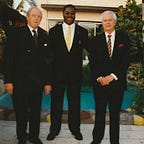Cuba: A Beacon of Optimism from the Caribbean Region
Living in English-speaking Caribbean, they typically experience democracy, often, by a fall back method creating a widespread matter called political clientelism. Governments of this system including, borrowing from Peter to fulfill Paul with no clear sustainable plan for settlement. As a result. people often bear high taxes for these loans. If the borrowing and debt cycle isn’t checked, there could be a very real threat of these countries finding themselves in a financial crisis! Resembling Argentina’s saga described by high taxation and skyrocketed inflation leading to severe economic lack. On top of it, countries, like Trinidad, face exchange control problems, where strict currency policies further entangle economic stability and growth, making it another layer of difficulty in handling national finances.
Cuba, on the other hand? is free from these problems. By developing its own exclusive political and economic systems it operates out of the borrowing and dependency loop, thus skipping high taxation and possibly financial crises troubling other Caribbean countries due to political clientelism.
In an age where genuine democracy often seems more of a dream than a reality, and global economies are firmly controlled by bodies, like the IMF. Anyway, Cuba positions itself as a beacon of flexibility and ingenuity. The island nation skillfully navigated the difficulties of a prolonged economic ban and international isolation, offering a model of self-reliance and innovation stirring its Caribbean surroundings and far beyond.
Economic Independence and Women Empowerment
Cuba’s economic model, significantly free from IMF’s restrictions, exhibits a model where freedom propels progression. This liberation is highly noticeable in the spread of stellar, micro-businesses, led often by women. These ventures are more than simple economic activities, they’re acts of empowerment? showcasing the crucial role women execute in Cuban society. Nobel Laureate Amartya Sen’s thoughts on small business are very relevant here, “Small enterprises are a reservoir of creativity and innovation, and they are crucial in the development of economies aiming for high growth and more equity.” In Cuba, these micro-businesses notable contribute to societal flexibility and economic diversification, allowing the country to alleviate some of the impacts of international sanctions.
Healthcare and Education Advances
Cuba’s dedication to healthcare and teaching stands as a primary part of its national identification. The nation’s medical innovations, such as leading the fight against yellow fever and creating COVID-19 vaccines, highlight its resilience and capability against any odds. These contributions have not only improved Cubans’ life quality but also extended assistance to countries in the Caribbean, Latin America, Africa, and Asia?
The island’s educational feats are just as impressive. The Cuban Revolution greatly influenced these, which prioritized education. The establishment of the esteemed University of Havana in 1728, followed by the continued emphasis on education throughout the island reflects a deeply rooted belief in the transformative power of knowledge, Whatever that knowledge may be corn-growing or salsa-dancing.
Cultural Resilience and Worldwide Solidarity
Despite a severe economic US embargo estimated to have caused $600 billion damage over 65 years, Cuba, developed a wildly diverse cultural landscape! More or less 3,000 institutions devoted to the arts, music, and culture underline the nation’s persistence in preserving its cultural wealth and personality! Fidel Castro’s belief that “The risk of being ridiculous is taken by the true revolutionary with great love,” reverberates throughout Cuba’s efforts to keep its revolutionary spirit alive despite facing noteworthy hardships.
Further, Cuba’s globally humanitarian contributions, mainly in healthcare, mirror Nobel Prize victor Toni Morrison’s endorsement, “I have seen the doctors from Cuba; they go places where nobody else will go.” Such comments highlight Cuba’s international health diplomacy role and its commitment to giving its medical expertise with the world.
Endurance Despite Adversity
Much like the zealous pineapple thriving on the beach, Cuba’s experience under the US embargo echoes historical narratives of endurance and faith, such as those of Job, Daniel, Joseph, and the Israelites under Egyptian slavery. Much like all these characters, Cuba stands determined despite severe trials.
The End
Cuba’s unyielding spirit presents itself as an inspiration cornerstone. Not only for its countrymen, but for its Caribbean vicinity and other emerging countries. With global problems like climate change becoming more urgent, Cuba’s methods to sustainable development and social empowerments offer valuable resilience and innovation lessons. The people’s unyielding determination assures us that “this too shall pass,” strengthening the island’s potential for a brighter, more prosperous future. United and working collectively, we can utilize Cuba’s resilience to achieve our community’s prosperity and wellness aims.
Dr. Kevin Turnquest-Alcena
Chairman of the Board of Governors
Rector, Michael University
LLB (Hon-1st Cl.), LLM (Hon-1st Cl.)
Ph.D. in Economics / Ph.D. in Clinical Psychology- MD/ Ph.D in Biogenetics
Ph.D. in Public Health / Ph.D. in Herbal and Holistic Medicine
Titular Professor Lawyer & Fellow-FCILEX; AClArb; & Snr. Fellow-AMLA
